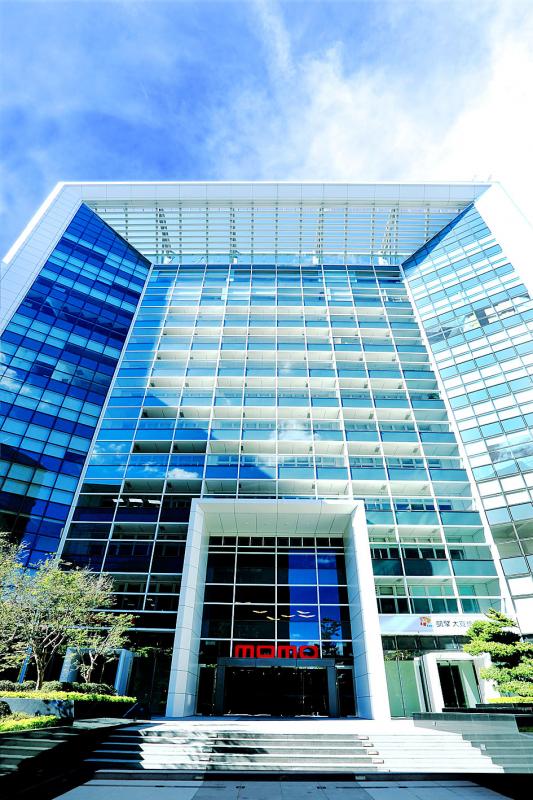Television and online retailer Momo.com Inc (富邦媒體) last week reported its highest quarterly profit since it was listed on the nation’s main board in 2014, driven by steady growth in its online business-to-customer segment and a disposal gain from the sale of Taiwan Pelican Express Co (台灣宅配通) shares.
Net profit increased 76.6 percent annually to NT$780.5 million (US$27.92 million) in the first quarter, or earnings per share of NT$5.57, the company said in a statement on Wednesday.
Momo.com said that its non-operating gains totaled NT$101.5 million in the first quarter, including a NT$99 million disposal gain from Pelican shares.

Photo: Vanessa Cho, Taipei Times
Quarterly revenue rose 21.6 percent to NT$18.36 billion, the second-highest quarterly sales in the company’s history, thanks to its increasing market share in Taiwan’s retail sector as more consumers embrace online shopping amid the COVID-19 pandemic, the company said.
“The number of active users and orders remained at a healthy level of 20 percent year-on-year during the quarter, indicating that Taiwanese consumers’ e-commerce value preference continued to shift to fast and free delivery, one-stop shopping and a quality online shopping experience,” Momo.com said.
Earnings before interest, taxes, depreciation and amortization (EBITDA) increased 42.6 percent to a record NT$1.07 billion in the first quarter, while the blended EBITDA margin came in at 5.8 percent, compared with 5 percent a year earlier, which the company attributed to stronger bargaining power with suppliers, and the effects of a larger sales scale and improved operating efficiency.
Momo.com, a retail subsidiary of Taiwan Mobile Co (台灣大哥大), operates three virtual platforms — online shopping, TV home shopping and catalog shopping.
The favorable results for the January-to-March period came as the firm’s business-to-customer segment, which accounted for 92.3 percent of its total revenue in the first quarter, expanded 24.5 percent year-on-year to NT$16.94 billion, aided by strong sales from fashion and luxury products, consumer electronics and home appliances, as well as greater demand for beauty and healthcare, and sports and leisure goods due to the pandemic.
To maintain its leadership position in Taiwan’s e-commerce market, the company said that it would continue to scale up its logistics network nationwide, including distribution centers and satellite warehouses, which would help it lower costs and shorten shipping times.
Momo.com said that it would start construction of its southern distribution center in Tainan’s Sinshih District (新市) in the second quarter of this year, with operations beginning in 2023.
The company’s northern distribution center in Taoyuan’s Dayuan District (大園) opened in 2017.
The company also aims to expand its number of satellite warehouses to 30, from 22, by the end of this year, it added.
Satellite warehouses serve as delivery access points where products are pre-stocked to shorten delivery times and improve operating efficiency, it said.

GROWING OWINGS: While Luxembourg and China swapped the top three spots, the US continued to be the largest exposure for Taiwan for the 41st consecutive quarter The US remained the largest debtor nation to Taiwan’s banking sector for the 41st consecutive quarter at the end of September, after local banks’ exposure to the US market rose more than 2 percent from three months earlier, the central bank said. Exposure to the US increased to US$198.896 billion, up US$4.026 billion, or 2.07 percent, from US$194.87 billion in the previous quarter, data released by the central bank showed on Friday. Of the increase, about US$1.4 billion came from banks’ investments in securitized products and interbank loans in the US, while another US$2.6 billion stemmed from trust assets, including mutual funds,

AI TALENT: No financial details were released about the deal, in which top Groq executives, including its CEO, would join Nvidia to help advance the technology Nvidia Corp has agreed to a licensing deal with artificial intelligence (AI) start-up Groq, furthering its investments in companies connected to the AI boom and gaining the right to add a new type of technology to its products. The world’s largest publicly traded company has paid for the right to use Groq’s technology and is to integrate its chip design into future products. Some of the start-up’s executives are leaving to join Nvidia to help with that effort, the companies said. Groq would continue as an independent company with a new chief executive, it said on Wednesday in a post on its Web

JOINT EFFORTS: MediaTek would partner with Denso to develop custom chips to support the car-part specialist company’s driver-assist systems in an expanding market MediaTek Inc (聯發科), the world’s largest mobile phone chip designer, yesterday said it is working closely with Japan’s Denso Corp to build a custom automotive system-on-chip (SoC) solution tailored for advanced driver-assistance systems and cockpit systems, adding another customer to its new application-specific IC (ASIC) business. This effort merges Denso’s automotive-grade safety expertise and deep vehicle integration with MediaTek’s technologies cultivated through the development of Media- Tek’s Dimensity AX, leveraging efficient, high-performance SoCs and artificial intelligence (AI) capabilities to offer a scalable, production-ready platform for next-generation driver assistance, the company said in a statement yesterday. “Through this collaboration, we are bringing two

Even as the US is embarked on a bitter rivalry with China over the deployment of artificial intelligence (AI), Chinese technology is quietly making inroads into the US market. Despite considerable geopolitical tensions, Chinese open-source AI models are winning over a growing number of programmers and companies in the US. These are different from the closed generative AI models that have become household names — ChatGPT-maker OpenAI or Google’s Gemini — whose inner workings are fiercely protected. In contrast, “open” models offered by many Chinese rivals, from Alibaba (阿里巴巴) to DeepSeek (深度求索), allow programmers to customize parts of the software to suit their